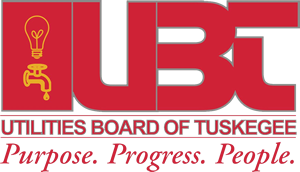For the first time since 2012, UBT will implement a rate adjustment for all residential customers effective November 1, 2025. This change will help ensure we continue to deliver the safe, reliable, and affordable utilities that the Tuskegee and Macon County communities depend on.
Customer Service: 334-720-0731
Report Outage: 334-720-0700
Attention:
Rate Increases effective November 1st
Residential Customers
- Electric Service: The current base charge is $15 per month.With a $3 increase, the new base charge will be $18 per month, regardless of usage.
- Water Service: The current base charge is $18.81 per month. With a $3 increase, the new base charge will be $21.81 per month.
- Sewer Service: The current base charge is $33.72 per month. With a $3 increase, the new base charge will be $36.72 per month.
Commercial/Industrial Customers Customers
Effective January 1, 2026, UBT’s power cost adjustment will align with wholesale supplier Energy Southeast’s base Energy Cost Adjustment of $0.031560/kWh
2019 Annual Drinking Water Quality Report
2019 Annual Drinking Water Quality Report
The Utilities Board of Tuskegee (aka-UBT) is a honored to present to you this year’s Annual Drinking W Quality Report! Designed to inform you of the quality of water and services we deliver to you every day, this report contains information on the results of the past year’s continual testing your water undergoes to insure your product is safe and of extremely high quality.
We want you to understand the investments made by UBT to continually improve the water treatment process and protect our water resources. The Mission Statement of the UBT Water Treatment Plant is to consistently provide a safe, clean, and palatable product (WATER) that is suitable for huma consumption. UBT’s Treatment Plant (WTP) is a 4 million-gallon per day facility that utilizes the Tallapoosa River as the raw water source. The Plant is located at 2323 Macon County Road 8 in Milstead. The raw water pumping station is located approximately one mile from the Treatment Plant. UBT has an updated Source Water Assessment Plan and is available at the Municipal Complex for review.
It provides information such as potential sources of possible contamination. UBT’s Treatment Plant collected samples for the EPA’s UCMR 4 Monitoring. This is when selected water systems collect samples for unregulated contaminants monitoring and reporting (UCMR) and the data is used to determine if any new contaminants will be added to the existing monitoring list; results from this monitoring is available for review at the Water Treatment Plant. UBT is committed to ensuring the quality of your water and our personnel work diligently to achieve the assurance of our commitment.
General Information
The sources of drinking water (both tap water and bottled water) include rivers, lakes, streams, ponds, reservoirs, springs, and wells. As water travels over the surface of the land or through the ground, it dissolves naturally occurring minerals and, in some cases, radioactive material, and can pick up substances resulting from the presence of animals or from human activity. Some people may be more vulnerable to contaminants in drinking water than the general population. People who are immuno-compromised, such as cancer patients undergoing chemotherapy, organ transplant recipients, HIV/AIDS positive or individuals with other immune system disorders, some elderly, and infants, can be particularly at risk from infections. Those at risk should seek advice about drinking water from the health care providers. EPA/CDC guidelines on appropriate means to lessen the risk of infection by Cryptosporidium and other microbial contaminants are available from the Safe Drinking Water Hotline (1-800-426-4791). Based on a study conducted by the ADEM with the approval of the EPA, a statewide waiver for the monitoring of Asbestos and Dioxin was issued. Thus, monitoring for these contaminants was not required.
Page 1 of

